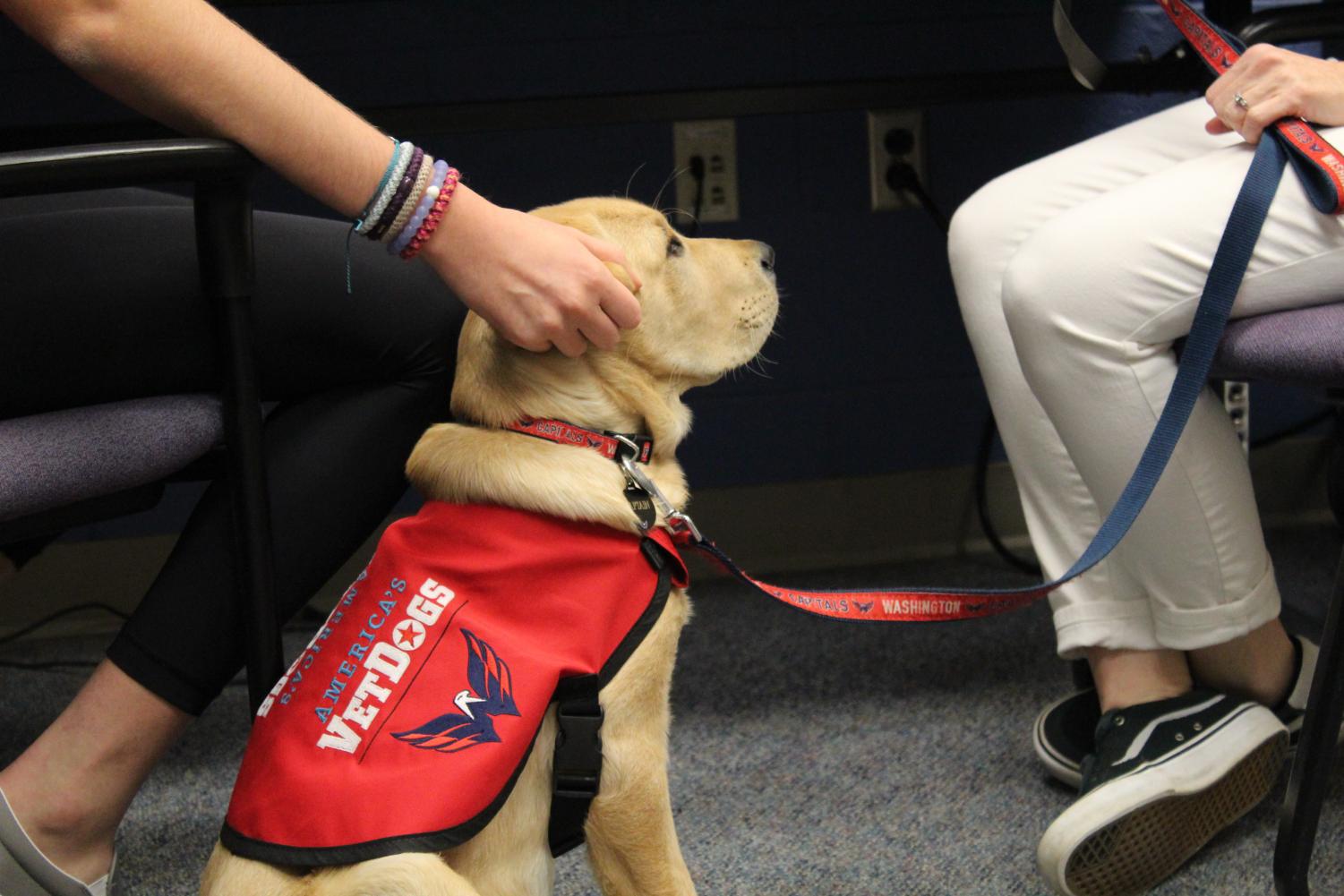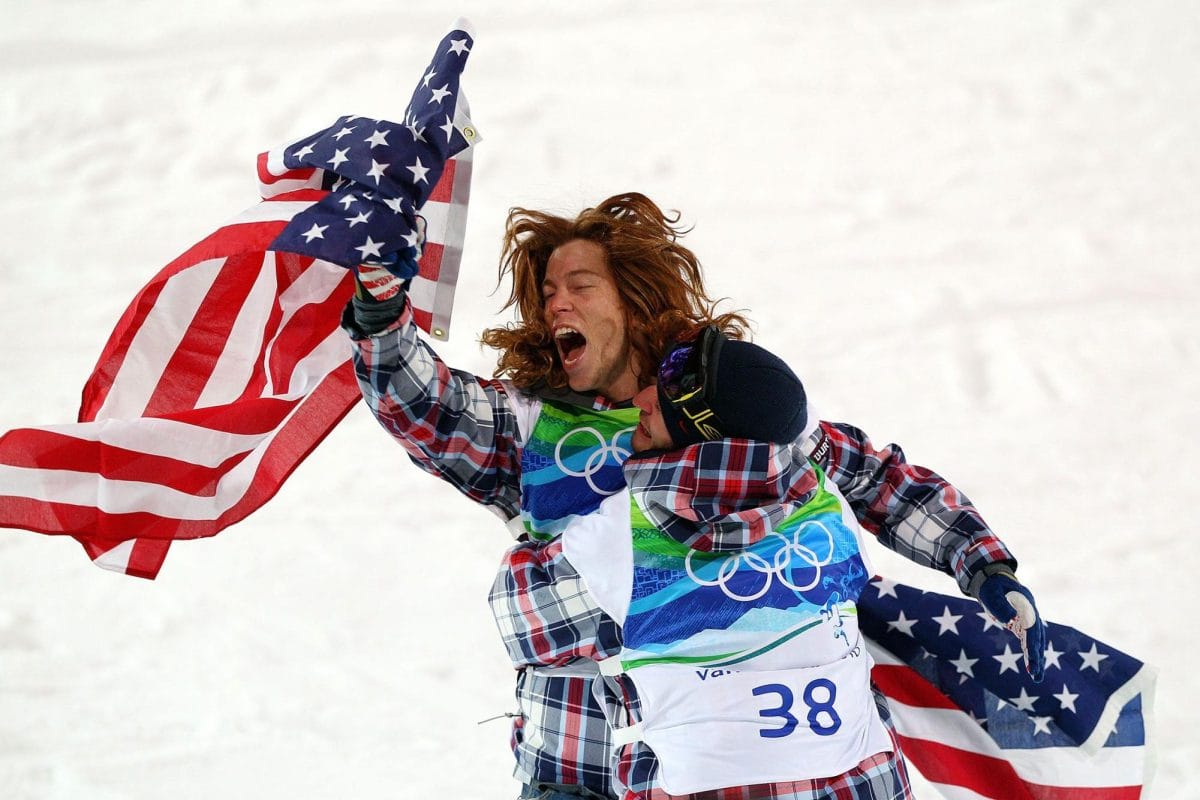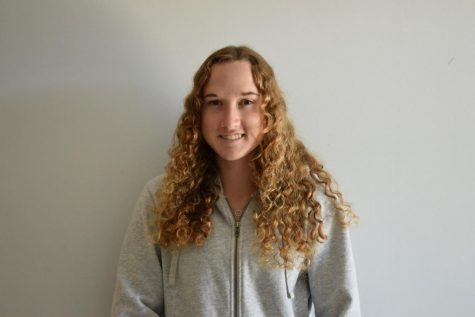On October 5, 2019, the Washington Capitals welcomed a new four-legged member to their hockey team. The organization teamed up with America’s VetDogs to bring the future service animal to Washington, D.C.
Since 2003, America’s VetDogs has trained and matched service dogs with disabled veterans and first responders. Though breeding and producing a well-trained service dog may cost thousands of dollars, America’s VetDogs supporters allow the organization to provide disabled individuals with their dogs free of charge.
Captain, or Caps Pup as Instagram knows him, was born July 22, 2019, but made his public debut on the red carpet prior to the Capitals’ home opener at the beginning of October. It was only fitting that Alex Ovechkin, the Capitals’ team captain, held the ten-week-old yellow lab golden retriever mix as he strutted down the carpet in front of paparazzi and fans.
It is important to know that Captain is training to be a service dog. As a service dog, Captain is required to perform some sort of task to help someone with a disability. He is protected under the Americans with Disabilities Act and has access rights to all public places.
Deana Stone, Captain’s ‘Puppy Raiser,’ began as a volunteer for America’s VetDogs and its sister organization, The Guide Dog Foundation, about seven years ago. She became the Puppy Program Representative for the D.C. Area two years ago.
The Capitals organization traveled to America’s VetDogs in Smithtown, New York, on Long Island to select Captain. They wanted a yellow male and tried to find the boldest, most confident from the litter. Merely four-weeks-old when the Caps viewed him, Captain fit that bill. America’s VetDogs breed for health and temperament so it is not surprising that Stone has yet to find something that overwhelms Captain.
“At the red carpet I was walking probably 20 feet behind Ovi, ready to jump in if I saw him get overwhelmed and I didn’t. He didn’t get overwhelmed at all. As a puppy raiser it is our job to watch the puppy’s body language for signs of stress. Some signs of stress may be panting when it’s not really that warm and when they’re not thirsty, or a lot of yawning. For example, if when Ovi was holding him and he did a lot of weird biting, that’s him saying this is too much. We are trained to look for those signs but I saw none of those in him. He was too busy licking Ovi’s face to care about anything or to become overwhelmed,” Stone said.
In addition to being alert of any stress that Captain may be experiencing, it is important that Stone gives him occasional mental breaks and allows him time to just be a puppy.
“I build in a lot of downtime for him. After about 15-20 minutes of taking pictures and getting pet by the public, he gets a break. I throw toys for him and just let him be a nut. At home he is allowed to be a normal puppy and play with my yellow lab, Smudge,” Stone said.
Stone has experience with famous puppies as her fourth puppy, Smudge, who is now her personal dog, had her training featured in the popular DoDo Instagram videos and her last puppy, Sunny, was a part of the program “Puppies With a Purpose” on an NBC station in Baltimore. Though Captain is not Stone’s first well-known puppy, he is definitely the most famous.
“People see him and you can just hear them suck air in and say “Is that?! … Within [Captain’s] first month with the Caps he already has over 50,000 followers. The only effect of his fame is all positive things. I mean he is so incredibly socialized. To know that he can handle a Washington Capitals game and everything else I throw at him, it is just going to make him a better service dog for somebody one day since he can handle any situation he is put in,” Stone said.
For the next 14-16 months, the Capitals organization will provide Captain with tons of socialization. The team will take him to community events, practices and even a few home games throughout the season to allow him to become a confident service dog. Stone’s job as his puppy raiser is to teach Captain basic training techniques and polite behavior.
“I’m going to teach him to push with his nose, which will allow him to eventually be able to push the handicap button, and push a drawer or a door closed. I’ll teach him some other things that someone with PTSD can use. I may even teach him to retrieve things like a phone or a credit card with his teeth,” Stone said.
After Captain completes his puppy raising with Stone and the Capitals, he will head up to America’s VetsDogs training site in Smithtown, New York. Sending her service dogs to New York after spending 14 months together is hard for Stone, but she says it is also extremely rewarding.
“If you don’t fall in love with these guys and feel any pain, then why are you doing this? I always tell people that I feel as though when you do something for others you give of yourself and this is my way of giving back. It’s certainly not easy to give them up but the moment you see them graduate with their person, every ounce of that heartache is absolutely worth it and I can’t wait to do it again,” Stone said.
The large training site on Long Island is where trainers will evaluate Captain and tentatively select who his veteran or first responder is going to be. The trainers will then take what Stone taught Captain to the next level and customize his training to his person’s needs.
“I’m going to be teaching him something called alert. What it will look like when I’m finished with it is I can lay on a couch or a bed pretending to be asleep and when I say alert he will come up and tap my leg at least three times with his nose. Then the trainers will take it even further. They’ll find out what kind of sounds and movements his person makes in their sleep when they are having a nightmare and they will teach him to wake the person based on those signs. He can even learn to take a blanket and rip it off of the person or to jump on the bed and lick the persons face to wake them up. It all just depends on the person’s needs,” Stone said.
At America’s VetDogs, professional trainers train the young dogs for a minimum of 12 weeks. After, the foundation brings the veteran or first responder to the training site on Long Island to train with their dog for an additional two weeks. Finally, the organization hosts what is called ‘Celebration Saturday,’ which is kind of like a graduation.
It is truly incredible what service dogs can do to help those with disabilities. With the help of his puppy raiser Deana Stone and the Washington Capitals organization, Captain has an extremely bright future ahead.
There are many ways to help America’s VetDogs. People can visit https://www.guidedog.org/ to submit an application to become a puppy raiser or to donate money to help the foundation cover the costs of breeding and producing high class service dogs.







































